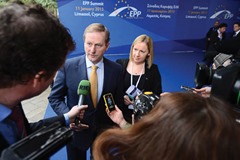Reform Alliance calls for change
 Lucinda Creighton’s political group is continuing to build its profile with a conference and potential moves towards party status.
Lucinda Creighton’s political group is continuing to build its profile with a conference and potential moves towards party status.
As the Reform Alliance’s first conference approaches in the RDS on 25 January, speculation about its intentions is continuing. Its seven-strong membership in the Oireachtas and registration as a ‘third party’ with the Standards in Public Life Commission suggest it is moving towards being a party.
Likewise, it has sketched out six policy priorities: economy growth; tax cuts; “dignity and security” for the elderly and vulnerable; tackling fraud in the public sector; protecting front-line health services; and educational diversity.
Out of these, political reform, the economy and health will be the key themes at the conference, which is likely to resemble a town hall meeting. The agenda suggests that nothing is ‘off the table’ in terms of political reform. The party whip system, legislative process, political fundraising and Civil Service accountability are all up for debate. The alliance called for a ‘no’ vote in the Seanad referendum as the upper house added checks and balances to the Dáil.
If a party were to form in September, as some commentators have suggested, it would avoid potential losses in the European Parliament and local elections. Such a move would bring back memories of the Progressive Democrats’ formation in 1985. Even if it remained a non-party, it would highlight the slow pace of political reform and challenge ministers to do more.
Creighton’s resignation came at a considerable political cost. Almost overnight, she moved from ministerial office to the opposition backbenches. She was respected inside the Department of Foreign Affairs and continues to hold a vice-presidency post in the European People’s Party. Just a week after leaving the party, she was in Washington to make a keynote speech on trans-Atlantic relations.
The other ex-Fine Gael members are also barred from standing again for the party, under its strict whip system. The formation of a new party would effectively end their chances of a return but, if success came in 2016, it could act as a coalition partner.
Some social conservative voters will have been dismayed by Fine Gael’s u-turn on abortion. Opinion polls on the size of this demographic vary but they may be attracted to Fianna Fáil which allowed a conscience vote and is generally conservative on the issue.
A conscience vote could also help the Reform Alliance to widen its base. Brian Hayes and Leo Varadkar regretted Creighton’s departure and Enda Kenny’s control of the party is now much firmer – thus making a ‘heave’ harder.
In a 2012 interview with eolas, Creighton said she was impressed with the capability of MEPs and added: “I simply wish we could achieve the same here in the Dáil.” She mooted her support for single-seat constituencies as female candidates often had “no prospect of being elected” in the current system.
Furthermore, a blog post from last October 2013 set out her intention to “forcibly place political reform on the top of the national agenda so that we can have a system that truly rewards those who stand with their convictions.”
Political deference, in her view, was rooted in Civil War politics and had “diluted” policies promised to voters in 2011. This also caused Cabinet ministers to defer to the Economic Management Council of Kenny, Gilmore, Noonan and Howlin “who essentially govern the country aided by their special advisers and senior civil servants.” The Seanad referendum showed the public’s “disdain for this form of power grab.”
At the last general election, the five Reform Alliance TDs gained 46,489 first preference votes, equivalent to a 2.1 per cent vote share. The PDs gained 11.9 per cent at their first general election in 1987.





